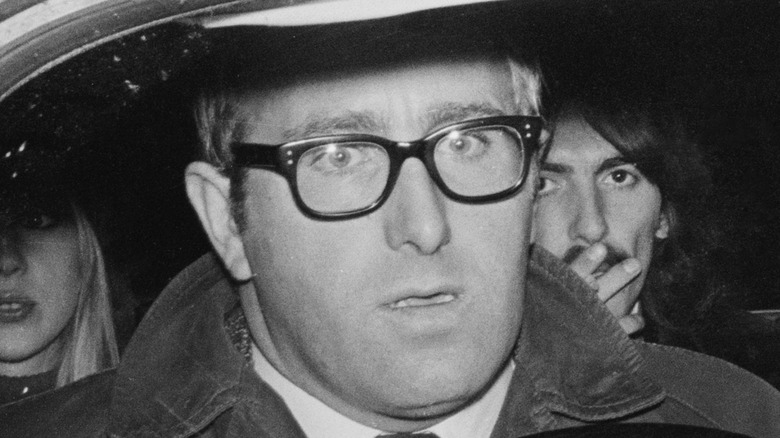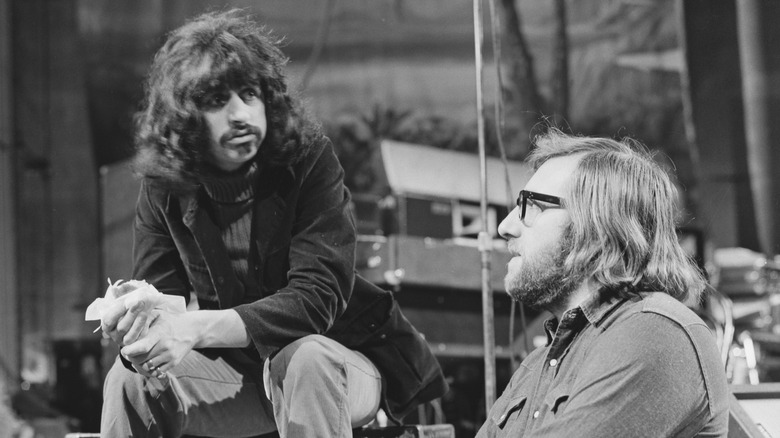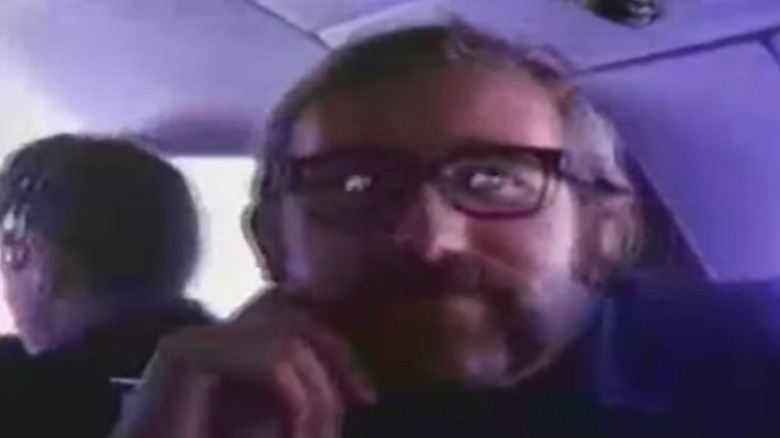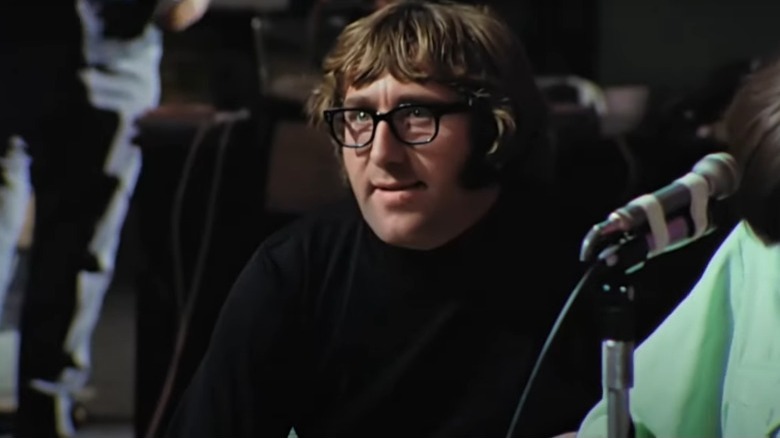The Tragic 1976 Death Of The Beatles' Road Manager Mal Evans
Though the music of The Beatles is dominated by the theme of love and is considered by many to be the uplifting soundtracks to the hippie movement throughout the 1960s, the early lives of the Fab Four, their incredible success as a band, and the years that followed in which they went their separate ways, were beset by multiple tragedies.
Both John Lennon and Paul McCartney had lost their mothers at an early age — a fact that many critics believe gave them their incredible bond. Long before The Beatles were famous, original bassist Stuart Sutcliffe — who left the band to become a painter — died of a cerebral brain hemorrhage in 1962. The Beatles' ever-present and loyal manager, Brian Epstein, died of what was believed to be an accidental drug overdose at the height of the band's fame, causing a power vacuum that would greatly contribute to their split. And, of course, Lennon himself would eventually lose his life in tragic circumstances, being shot while walking in New York City with his wife Yoko Ono in December 1980.
But there is another little-known tragedy in The Beatles' story: that of their road manager, Mal Evans, who, like Lennon, was shot and killed when he was just 40 years old. Here is the tragic story of Mal Evans.
Mal Evans: Beatles stalwart
A fellow Liverpudlian, Mal Evans' relationship with The Beatles went way back to the early days of the band's career when they were a headline act in Liverpool's world-famous Cavern Club. Just a few years older than John Lennon, Evans had been a telephone engineer in his early adulthood before finding work as an occasional security guard at the club, where he made the acquaintance of the future stars, according to "The Love You Make: The Inside Story of The Beatles," by Peter Brown.
Evans grew close to The Beatles when their usual assistant, Neil Aspinall, caught flu, and Evans stepped in as their driver. This meant that they were able to make it to an important radio interview in London. Per the same source, Evans remained an integral part of The Beatles' world from then on, with his duties involving driving and security. Even on one of their first trips to the U.S., he forged the signatures of John, Paul, George, and Ringo on countless press photographs that they could then hand out to adoring fans on the airport runway.
When The Beatles had punishing tour schedules, it was Evans' responsibility to source amphetamines to help the band perform with energy and make sure they made it to the next concert on time. When they met Bob Dylan — who introduced the Fab Four to marijuana — Evans was there and was asked by Paul McCartney to take handwritten notes of the bizarre, stoned thoughts he was having.
The shocking killing of Mal Evans
Along with Neil Aspinall, Mal Evans remained as a bodyguard and an intimate aide to The Beatles until their dissolution in 1970. Ringo Starr recalled that Evans made a great bodyguard because, "he would never hurt anyone. He was just big enough to say, Excuse me, let the boys through. He was pretty strong. He could lift the bass amp on his own, which was a miracle. He should have been in the circus." (per The Beatles Anthology).
Though he found work as a producer in Los Angeles — most notably producing Keith Moon's debut solo album, "Two Sides of the Moon," in 1974, per All Music – Evans never recovered from the break-up of The Beatles and the meaning that assisting the biggest band in the world had given him. According to biographer Barry Miles, in his book, "Paul McCartney: Many Years from Now," Evans separated from his wife and was living with his new girlfriend, Fran, attempting to finish a draft of a memoir of his life with The Beatles. On January 5, 1976, friends were concerned at Evans' erratic behavior — he took valium, and was in possession of a reportedly unloaded rifle — so much so that Fran called the police to calm down her partner.
As Paul McCartney recalled in "The Beatles Anthology": "[Evans] was a loveable bear of a roadie, he would go over the top occasionally, but we all knew him and never had any problems. The LAPD weren't so fortunate. They were just told that he was upstairs with a shotgun and so they ran up, kicked the door in and shot him."
Revisiting Mal Evans
The aftermath of Mal Evans' death was notoriously messy. Many of the former road manager's personal possessions went missing in the ensuing police investigation, including the manuscript of his memoir, according to Ultimate Classic Rock. Evan's remains were cremated, and shipped to his family in the U.K. by his famous friend, Harry Nilsson. However, his ashes were lost by the British postal service for a long time, causing extra pain to his family.
In recent years, the treatment of Mal Evans and numerous other crucial members of The Beatles' entourage as well as the band's management has been the subject of much debate. Though the Fab Four always spoke highly of him, George Harrison noted in "The Beatles Anthology" that the band's manager, Brian Epstein, was earning 100 times more per week than Neil Aspinall and Mal Evans, who were earning slightly above a regular wage, despite working for the biggest band in the world.
In 2021, Mal Evans' name was once again on the lips of fans, thanks to the hugely-popular Peter Jackson documentary series, "The Beatles: Get Back," which aired on Disney+. In it, an innocently smiling Evans is shown joining the band in the process of recording, including striking an anvil with a mallet as a percussive accompaniment to Paul McCartney's "Maxwell's Silver Hammer." Later that same year, news followed that Evans would soon have the spotlight on him, thanks to a new biography, due for publication in 2023, according to NME.



